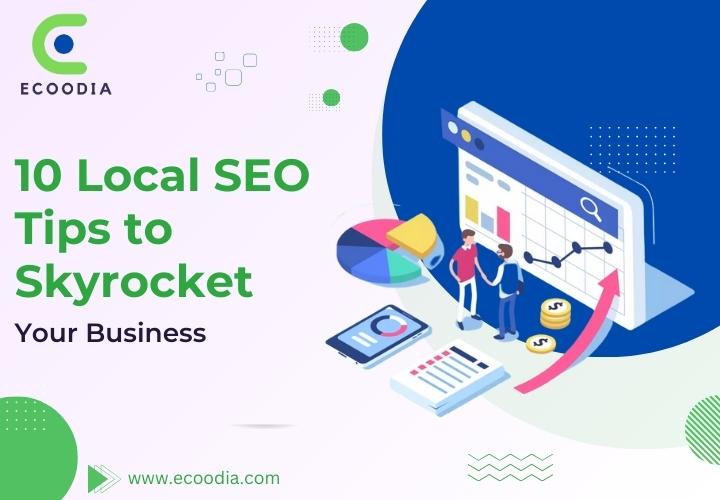10 Local SEO Tips to Skyrocket Your Business 2025

In today's digital time, local SEO is the key to putting your business on the map—literally. If you want to attract more local customers and boost your online presence, you need to optimize your local SEO strategy. But how can you do that effectively? Here are 10 local SEO tips to skyrocket your business and ensure you stay ahead of the competition.
Introduction
Local SEO is all about optimizing your online presence to attract more business from relevant local searches. According to HubSpot, 46% of all Google searches are looking for local information, meaning if your business is not optimized for local search, you could be missing out on potential customers who are ready to shop in your area. Let's dive into some actionable tips to help you boost your local SEO and draw in more local customers.
1. Optimize Your Google My Business Profile
One of the most effective ways to improve your local SEO is by claiming and optimizing your Google My Business (GMB) profile. This free tool from Google allows you to manage how your business appears on Google Search and Maps.
How do I optimize my GMB profile?
- Complete all the information: Ensure your profile is fully filled out with your business name, address, phone number, website, and business hours.
- Add high-quality photos: Include pictures of your storefront, products, and services.
- Encourage reviews: Ask satisfied customers to leave positive reviews and respond to them promptly.
2. Use Local Keywords
Incorporate local keywords into your website content to improve your chances of appearing in local search results. Use tools like Google Keyword Planner or Moz, ahref, semrush to find relevant local keywords for your business.
What are local keywords?
- Local keywords are search terms that include specific locations, such as "best coffee shop in San Francisco" or "hair salon near me."
3. Create Location-Specific Content
Craft content that is relevant to your local audience. This could include blog posts about local events, news, or community activities. Localized content helps search engines understand that your business is relevant to the local area.
What type of local content should I create?
- Write about local events your business is participating in.
- Share stories about your involvement in the community.
- Highlight local industry news and trends.
4. Optimize for Mobile
Since many local searches are conducted on mobile devices, having a mobile-friendly website is crucial. Google also considers mobile-friendliness as a ranking factor.
How can I make my website mobile-friendly?
- Use responsive design: Ensure your website adjusts seamlessly to different screen sizes.
- Optimize loading times: Speed up your website by compressing images and using efficient coding practices.
- Simplify navigation: Make it easy for users to find information quickly.
5. Get Listed in Online Directories
Make sure your business is listed in relevant online directories such as Yelp, Yellow Pages, and local chamber of commerce websites. Consistent NAP (Name, Address, Phone number) information across these directories helps improve your local SEO.
Why are online directories important for local SEO?
- They increase your online visibility.
- They provide valuable backlinks to your website.
- Consistent listings build trust with search engines.
6. Leverage Customer Reviews
Positive reviews not only enhance your online reputation but also influence local search rankings. Encourage your customers to leave reviews on Google, Yelp, and other review sites.
How can I get more customer reviews?
- Ask customers directly: After a successful sale or service, ask if they’d be willing to leave a review.
- Simplify the process: Provide links to your review profiles in follow-up emails.
- Respond to reviews: Show appreciation for positive feedback and address negative reviews constructively.
7. Use Local Schema Markup
Schema markup is a code that you put on your website to help search engines return more informative results for users. Local schema markup can improve your local SEO by providing search engines with detailed information about your business.
What is local schema markup?
Local schema markup is a type of microdata that helps search engines understand the specific details of your business, such as your address, business hours, and services.
8. Build Local Backlinks
Earning backlinks from reputable local websites can boost your local search rankings. Partner with local businesses, sponsor local events, or contribute guest posts to local blogs to build these links.
How do local backlinks improve SEO?
- They signal to search engines that your business is relevant and authoritative within the local area.
- They drive referral traffic to your website.
9. Optimize Your Website for Local Searches
Ensure your website is optimized for local search terms. This includes adding your city and state in title tags, meta descriptions, headers, and throughout your content.
How can I optimize my website for local searches?
- Use location-based keywords.
- Include your address and phone number on every page.
- Embed a Google Map on your contact page.
10. Monitor Your Local SEO Performance
Use tools like Google Analytics and Google Search Console to track your local SEO performance. Monitor your website traffic, keyword rankings, and local search visibility to understand what’s working and what needs improvement.
What metrics should I track for local SEO?
- Organic search traffic
- Local search rankings
- Click-through rates from local searches
- Conversion rates from local visitors
Conclusion
By implementing these local SEO tips, you can enhance your online visibility and attract more local customers. Remember, local SEO is an ongoing process that requires regular updates and monitoring. Stay ahead of the competition by continuously optimizing your local SEO strategy and adapting to new trends and changes in search algorithms.
Boosting your local SEO is not just about being found—it's about being found by the right people, at the right time, in the right place.
Read More Article: Index Backlinks in 2025: Boost Your SEO Rankings Faster
